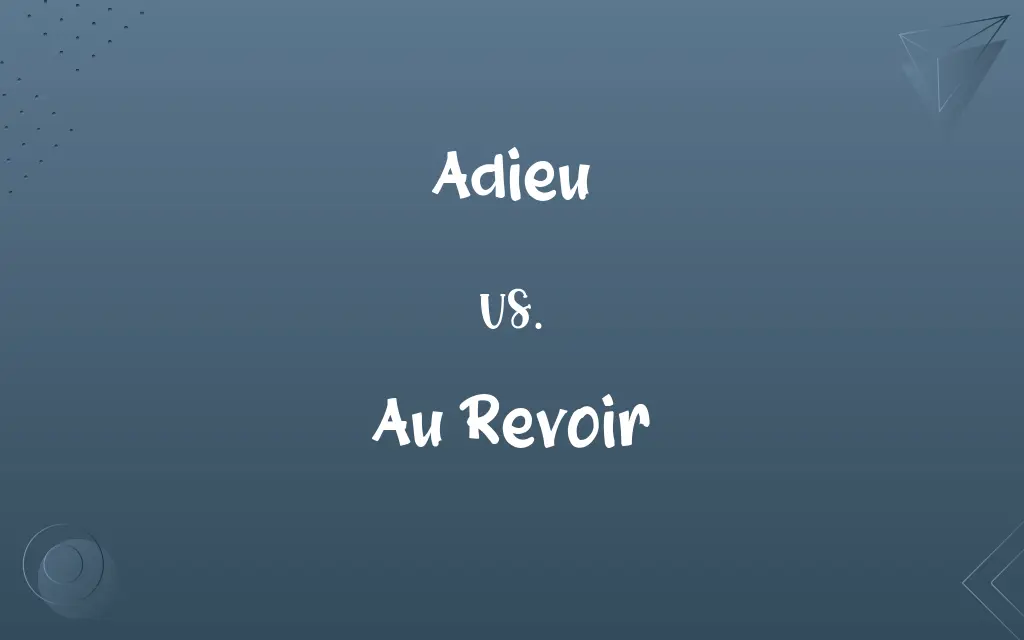Adieu vs. Au Revoir: Know the Difference

By Dua Fatima & Hifza Nasir || Published on March 4, 2024
"Adieu" implies a final farewell, while "Au Revoir" suggests a temporary goodbye, indicating plans to meet again.

Key Differences
"Adieu" is a French term used when parting ways without the expectation of seeing each other again, carrying a sense of permanence. In contrast, "Au Revoir" literally means "until we see each other again," embodying a hopeful tone of reunion. This fundamental difference highlights the level of finality associated with each expression.
Hifza Nasir
Mar 04, 2024
The use of "Adieu" often conveys a more emotional or solemn farewell, suitable for situations of significant parting. "Au Revoir," however, is casual and commonly used in daily conversations when leaving friends or acquaintances, with an implicit intention of future encounters.
Dua Fatima
Mar 04, 2024
Understanding the context in which to use "Adieu" versus "Au Revoir" is crucial for appropriate communication. "Adieu" might be used in letters or speeches marking a significant life change, while "Au Revoir" fits more transient, everyday departures.
Dua Fatima
Mar 04, 2024
Cultural nuances also play a role in the usage of these phrases. While both are French, their adoption in different languages and cultures can affect their perceived weight and formality. "Adieu" tends to retain its gravitas across languages, whereas "Au Revoir" is universally recognized as a lighter, more casual farewell.
Dua Fatima
Mar 04, 2024
"Adieu" is often used to underscore dramatic farewells or endings, whereas "Au Revoir" can be found in contexts that imply continuity or future story development, reflecting their respective implications of permanence and temporariness.
Hifza Nasir
Mar 04, 2024
ADVERTISEMENT
Comparison Chart
Cultural Nuance
Maintains gravitas across cultures
Universally casual and transient
Hifza Nasir
Mar 04, 2024
ADVERTISEMENT
Adieu and Au Revoir Definitions
Adieu
Used in permanent separations.
The migrants said adieu to their homeland, embarking on a new journey.
Dua Fatima
Feb 27, 2024
Au Revoir
Light and hopeful in tone.
The note ended with Au Revoir, promising future correspondence.
Shumaila Saeed
Feb 27, 2024
Au Revoir
A goodbye until next time.
Au revoir! she called out, expecting to see her friend soon.
Hifza Nasir
Feb 27, 2024
Adieu
Carries a heavy emotional weight.
With a heavy heart, he bid adieu to his past life.
Hifza Nasir
Feb 27, 2024
ADVERTISEMENT
Au Revoir
Implies an intention to reunite.
After the meeting, they parted with a cheerful Au Revoir!
Dua Fatima
Feb 27, 2024
Adieu
Reflects acceptance of finality.
At the funeral, we said our adieus, letting go of her presence in our lives.
Hifza Nasir
Feb 27, 2024
Au Revoir
Casual and commonly used.
He waved, saying Au Revoir to his colleagues for the weekend.
Dua Fatima
Feb 27, 2024
Adieu
A final farewell.
She whispered adieu, knowing they would never meet again.
Dua Fatima
Feb 27, 2024
Au Revoir
Suitable for transient farewells.
Au Revoir, the teacher said, dismissing the class until tomorrow.
Hifza Nasir
Feb 27, 2024
Adieu
A farewell, a goodbye; especially a fond farewell, or a lasting or permanent farewell.
We bid our final adieus to our family, then boarded the ship, bound for America.
Dua Fatima
Jan 25, 2024
Repeatedly Asked Queries
What does "Adieu" mean?
"Adieu" means a final goodbye, suggesting that the parties do not expect to meet again.
Hifza Nasir
Mar 04, 2024
How is "Au Revoir" different from "Adieu"?
"Au Revoir" implies a temporary goodbye with the intention of meeting again, unlike the finality of "Adieu."
Dua Fatima
Mar 04, 2024
Can "Adieu" be used casually?
Typically, "Adieu" carries a heavier emotional weight and is reserved for more solemn or significant farewells.
Shumaila Saeed
Mar 04, 2024
In what context should I use "Adieu"?
Use "Adieu" in contexts of permanent parting or when you believe you won't see someone again.
Hifza Nasir
Mar 04, 2024
Is "Au Revoir" suitable for formal occasions?
While it can be used in formal settings, "Au Revoir" is generally considered casual and best for situations where you expect to see the person again.
Dua Fatima
Mar 04, 2024
How do cultural nuances affect the use of these terms?
Cultural understanding of these terms can vary; "Adieu" is universally seen as more solemn, while "Au Revoir" is widely understood as a lighter, more casual farewell.
Dua Fatima
Mar 04, 2024
How does the implication of "Au Revoir" influence its use in conversation?
Its implication of a future reunion makes it suitable for everyday departures and less serious farewells.
Dua Fatima
Mar 04, 2024
Can "Adieu" be used in a non-literal sense?
Yes, "Adieu" can be used metaphorically to signify the end of an era or relationship, not just physical departures.
Dua Fatima
Mar 04, 2024
Why might someone choose "Adieu" over "Au Revoir"?
Someone might choose "Adieu" to convey the seriousness or permanence of their farewell.
Shumaila Saeed
Mar 04, 2024
What makes "Au Revoir" a preferred choice for daily use?
Its casual nature and implication of temporariness make it the go-to for daily, non-final goodbyes.
Hifza Nasir
Mar 04, 2024
Can these terms be used interchangeably?
Given their distinct implications, using them interchangeably could convey the wrong message about the nature of the farewell.
Hifza Nasir
Mar 04, 2024
Is it common to use these phrases in English?
Yes, both "Adieu" and "Au Revoir" are used in English, often retaining their original implications from French.
Dua Fatima
Mar 04, 2024
What emotional weight does "Au Revoir" carry?
"Au Revoir" carries a light, hopeful emotional weight, suggesting optimism about future meetings.
Shumaila Saeed
Mar 04, 2024
What does the use of "Adieu" or "Au Revoir" reveal about the speaker's intentions?
It reveals the speaker's expectations about the future of their relationship with the person they are addressing, whether they anticipate a reunion or not.
Dua Fatima
Mar 04, 2024
How do you decide which farewell to use in a bilingual context?
The choice depends on the level of formality, the relationship with the person, and the cultural context of the conversation.
Shumaila Saeed
Mar 04, 2024
Share this page
Link for your blog / website
HTML
Link to share via messenger
About Author
Written by
Dua FatimaCo-written by
Hifza Nasir








































































